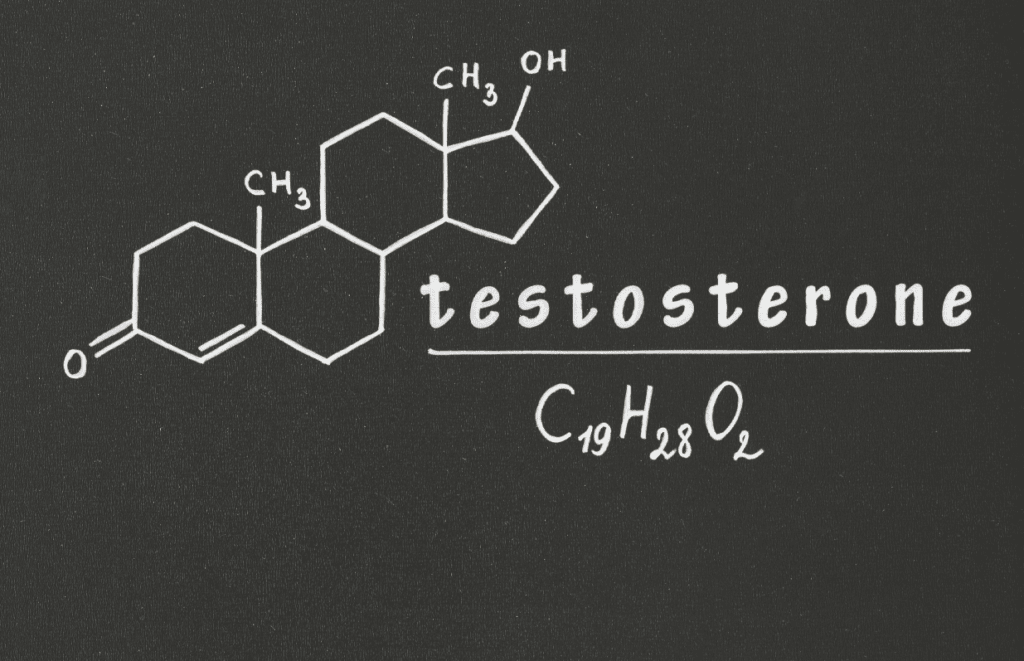Many people struggle with low testosterone, leading to problems like low energy, weak muscles, and mood issues. This problem affects their daily life and happiness.
Table of Contents
Testosterone Replacement Therapy (TRT) online offers a way to fix these issues, improving health and mood. Online TRT makes getting help easy and personal, fitting into your life.
This article talks about the science of Testosterone Replacement Therapy online or online TRT works and why it’s a good choice for feeling better.

Understanding Testosterone and Its Role in the Body
Testosterone is a hormone primarily produced in the testicles in men and in smaller amounts in the ovaries in women. It is often associated with male characteristics, but it plays crucial roles in both male and female bodies.

What is Testosterone?
Testosterone is a steroid hormone belonging to the androgen group. It is responsible for the development of male reproductive tissues and the promotion of secondary sexual characteristics, such as increased muscle and bone mass, and the growth of body hair.
The Role of Testosterone in the Body
In addition to its role in sexual development, testosterone also contributes to overall health and well-being. It plays a part in regulating mood, cognitive function, and energy levels. Furthermore, testosterone is essential for maintaining bone density, muscle mass, and fat distribution.
Effects of Low Testosterone Levels
Low testosterone levels, also known as hypogonadism, can lead to a range of symptoms, including decreased libido, erectile dysfunction, fatigue, depression, and reduced muscle mass. In some cases, it can also contribute to the development of osteoporosis.
Testosterone Replacement Therapy (TRT) Explained
Testosterone Replacement Therapy (TRT) is a medical treatment designed to restore testosterone levels to a normal range in individuals with low testosterone. It involves the use of medications that contain synthetic testosterone or stimulate the body to produce more testosterone.
TRT works by supplementing the body with testosterone to achieve normal levels, thereby alleviating the symptoms associated with low testosterone. This can be achieved through various forms of administration, including injections, gels, patches, and implants.
Benefits of Testosterone Replacement Therapy
Increased Muscle Mass and Strength
One of the primary benefits of TRT is the potential for increased muscle mass and strength, which can be particularly beneficial for individuals experiencing muscle loss due to low testosterone levels.
Improved Bone Density
TRT has been shown to improve bone density, reducing the risk of osteoporosis and fractures in individuals with low testosterone levels.
Enhanced Libido and Sexual Function
Restoring testosterone levels through TRT can lead to improvements in libido, sexual function, and overall sexual satisfaction for men with low testosterone levels.
Risks and Side Effects of Testosterone Replacement Therapy
Potential Risks and Complications
While TRT can be beneficial for many individuals, it is not without potential risks. Some studies have suggested an association between TRT and an increased risk of nonfatal myocardial infarction, acute kidney injury, and adverse cardiac events, particularly in men with a history of high-risk cardiovascular disease.
Common Side Effects of TRT
Common side effects of TRT can include acne, fluid retention, breast enlargement, and an increase in red blood cell count. It is important for individuals undergoing TRT to be monitored for these potential side effects.
Monitoring and Managing Side Effects
Regular monitoring and management of side effects are essential components of TRT. Healthcare providers will typically conduct routine blood tests to assess testosterone levels and monitor for any adverse effects.
Who are the Candidates for Testosterone Replacement Therapy?
Symptoms of Low Testosterone
Men with low testosterone levels may experience symptoms such as decreased libido, erectile dysfunction, fatigue, depression, irritability, and reduced muscle mass.
Who Can Benefit from TRT?
TRT may be beneficial for men with clinically low testosterone levels who are experiencing symptoms that significantly impact their quality of life. It is important for individuals to undergo thorough evaluation and consultation with a healthcare provider before starting TRT.
Medical Conditions that May Contraindicate TRT
Certain medical conditions, such as prostate cancer, breast cancer, and severe lower urinary tract symptoms, may contraindicate the use of TRT. It is essential for individuals to discuss their medical history with a healthcare provider to determine if TRT is suitable for them.
The Process of Getting Testosterone Replacement Therapy Online
Telemedicine and Online TRT Services
Advancements in telemedicine have made it possible for individuals to access the best TRT online services online. This allows for remote consultations, evaluations, and the delivery of TRT medications to individuals in need of treatment.
With platforms like Best TRT online, patients can receive personalized care tailored to their specific needs, ensuring they get the most effective treatment plan.
This seamless integration of technology and healthcare means that support for low testosterone is more accessible than ever, making Best TRT online a top choice for those seeking to improve their quality of life through hormone therapy.
Consultation and Evaluation Process
The online TRT process typically involves an initial consultation with a healthcare provider, during which the individual’s medical history, symptoms, and potential risk factors are assessed to determine the appropriateness of TRT.
Prescription and Delivery of TRT Medications
Following the evaluation, if TRT is deemed appropriate, the healthcare provider can prescribe the necessary medications, which can then be delivered to the individual’s location for convenient access.

Monitoring and Adjusting Testosterone Replacement Therapy
Regular Blood Tests and Monitoring
Individuals undergoing TRT will require regular blood tests to monitor testosterone levels, hematocrit, and other relevant parameters to ensure the therapy is effective and safe.
Adjusting TRT Dosage and Treatment Plan
Based on the results of blood tests and the individual’s response to treatment, healthcare providers may need to adjust the dosage and treatment plan to optimize the benefits of TRT or Testosterone Replacement Therapy online while minimizing potential risks.
Long-term Considerations and Follow-up Care
Long-term considerations for individuals on TRT include ongoing monitoring, follow-up appointments, and discussions with healthcare providers to address any concerns or changes in symptoms.
Lifestyle Considerations for Optimizing Testosterone Levels
Diet and Nutrition for Testosterone Support
A balanced diet rich in nutrients such as zinc, vitamin D, and healthy fats can support healthy testosterone levels. Additionally, maintaining a healthy weight and avoiding excessive alcohol consumption can also positively impact testosterone levels.
Exercise and Physical Activity Recommendations
Regular physical activity, including both cardiovascular and strength training exercises, can help support healthy testosterone levels and overall well-being.
Stress Management and Sleep Hygiene for Hormonal Balance
Managing stress and ensuring adequate sleep are important factors in maintaining hormonal balance, including testosterone levels. Practices such as mindfulness, relaxation techniques, and prioritizing sleep can contribute to overall hormonal health.
Testosterone Replacement Therapy Online – Conclusion
Testosterone Replacement Therapy online offers a valuable treatment option for individuals with low testosterone levels, providing potential benefits such as increased muscle mass, improved bone density, and enhanced libido.
However, it is essential for individuals to make informed decisions about TRT, considering the potential risks and contraindications, and seeking guidance from healthcare providers. As the landscape of TRT continues to evolve, it holds promise for the future of men’s health and well-being.



